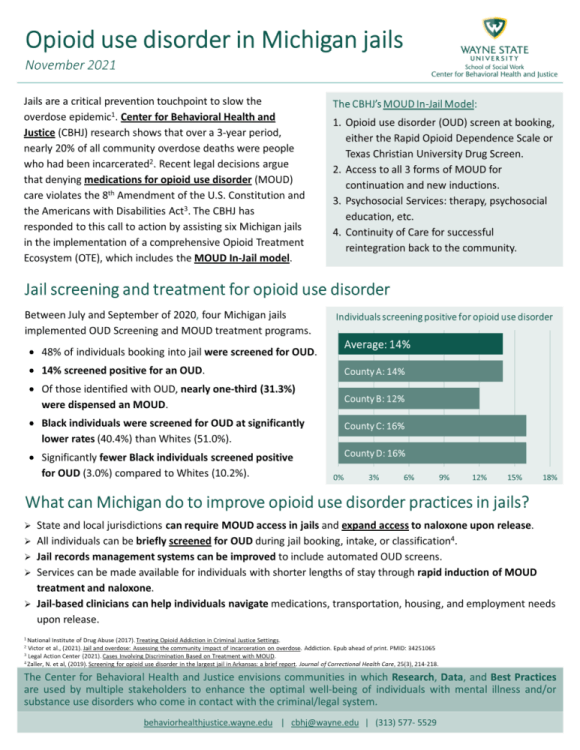Opioid use disorder prevalent in Michigan’s jails finds new research from the CBHJ
MICHIGAN - New research from the Center for Behavioral Health and Justice at Wayne State University’s School of Social Work has found that at least fourteen percent of people in Michigan’s jails likely have opioid use disorder. However, less than half (48%) of individuals booked into jail were screened for opioid use disorder.
 The jail-based research has also shown that fewer Black individuals screened positive for opioid use disorder (3.0%) than white individuals (10.2%), and Black individuals were screened at significantly lower rates (40.4%) than white individuals (51.0%). These findings may indicate that Black individuals with opioid use disorder are at higher risk for being processed through the jail without being identified.
The jail-based research has also shown that fewer Black individuals screened positive for opioid use disorder (3.0%) than white individuals (10.2%), and Black individuals were screened at significantly lower rates (40.4%) than white individuals (51.0%). These findings may indicate that Black individuals with opioid use disorder are at higher risk for being processed through the jail without being identified.
Jails are a critical prevention touchpoint to slow the overdose epidemic, as people with OUD are up to 120 times more likely to die of an overdose following release from incarceration, and engaging people in treatment before release has been shown to reduce their risk for fatal overdose. Treatment plans for individuals with opioid use disorder that include medications for opioid use disorder have been identified as the gold standard of care for the medical condition.
Jail facilities in the state that do not address opioid use disorder according to an evidence-based standard of care may find themselves exposed to increasing liability. Last month, the ACLU filed suit against the Grand Traverse County Jail over their policy on not providing medication for opioid use disorder, citing violations to the Americans for Disabilities Act and the 8th Amendment. Access to medications for opioid use disorder has increasingly become the subject of litigation and investigation by the Department of Justice across the country. Court rulings in Massachusetts, Maine, and New York have required facilities provide access to prescribed medications for opioid use disorder.
In order to improve opioid use disorder practices, jails and the State can require access to medications for opioid use disorder in jails, provide screening for opioid use disorder, and modernize jail records management systems. Improving opioid use disorder practices will reduce liability, improve identification and treatment, and ultimately reduce the prevalence of opioid use disorder in Michigan’s jails.
Learn more about the CBHJ’s findings about opioid use disorder in Michigan’s jails and the recommendations for improving practices by reading the policy brief here.
About the Center for Behavioral Health and Justice: The Wayne State University School of Social Work Center for Behavioral Health and envisions communities in which research, data, and best practices are used by multiple stakeholders to enhance the optimal well-being of individuals with mental illness and/or substance use disorders who encounter the criminal/legal system. Learn more